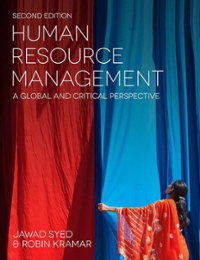For the past 45 years Bangladesh has been working towards a society that is poverty and hunger
Question:
For the past 45 years Bangladesh has been working towards a society that is poverty and hunger free. In more recent years, the political environment and economic approach has moved away from a subsidised socialist orientation towards a free market economy, which has resulted in significant economic growth. Bangladeshi factories are now considered key suppliers of products to MNCs in the garment, electronics, pharmaceutical, and other labour-intensive industries. Given limited natural resources and an abundance of human resources, the efficiency and efficacy of HRM practices within Bangladeshi organisations could play a crucial role in Bangladesh's further economic development.
Bangladeshi employers, however, are being blamed for unethical HRM practices, including labour exploitation, the provision of non-inclusive employment practices, and poor safety standards. The collapse of the Rana Plaza factory building in 2013, with a loss of more than 1,100 lives, brought these concerns to the world's attention (Lund-Thomsen and Lindgreen, 2014). Equal employment opportunities are also problematic in Bangladesh: indigenous minority groups and people with disabilities are often deprived of opportunities for employment. Another issue lies in the reward available to employees in certain industries, evidenced by Bangladesh having the lowest manufacturing wages in the world.
The labour market context also plays a role in the way employers view the importance (or in this case the unimportance) of sound HR practice. The high unemployment rate in Bangladesh means that there is a permanent oversupply of people looking for work, and organisations seldom find it difficult to recruit or retain suitable employees. Against this backdrop, the competition for limited job opportunities provides an impetus for management to engage in nepotistic practices, whereby friends and relatives are favoured in recruitment and selection practices. This is exacerbated by the lack of government regulation in place to control recruitment and selection activities.
Most organisations in Bangladesh are family owned and managed by family members resulting in a system of 'family or crony-capitalism'. Under such a system human resource management activities become the sole domain of owners and their idiosyncratic needs, with little or no regard to the needs of their workers. Employers have so far failed to understand that the adoption of systematic, fair and 'good' HR practices are in their best interest.
In recent years, however, there has been increasing pressure from outside the country, which is leading organisations to change their corporate culture and HRM practices. EU and North American countries have been putting pressure on labour-intensive and export-oriented industries to adopt ILO labour-rights standards and to improve their factories' working conditions. Arguably, improved HRM practices, working conditions, and better wage rates could improve the productivity and the profitability of organisations in Bangladesh.
Questions
This case study raises important issues that are covered throughout this chapter. These include:
1 What are the long-term implications for both employees and employers of unfair HR practices in Bangladeshi organisations?
2 What are the implications of unethical HR practices for the way in which corporate social responsibility (CSR) in Bangladesh is viewed by the wider global economy?
Step by Step Answer:

Human Resource Management A Global And Critical Perspective
ISBN: 9781137521620
2nd Edition
Authors: Jawad Syed, J; Kramar Syed, Robin Kramar





